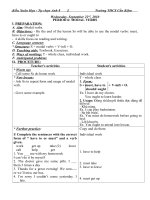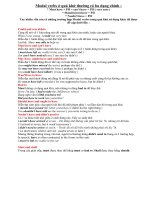Tchon 13. MODAL VERBS( MAY, MIGHT, CAN, COULD).doc
Bạn đang xem bản rút gọn của tài liệu. Xem và tải ngay bản đầy đủ của tài liệu tại đây (121.25 KB, 2 trang )
Topic4: MY NEIGHBORHOOD
PERIOD 13. MODAL VERBS: MAY, MIGHT, CAN, COULD
A. Revision:
1. CAN = có thể, có khả năng Sau CAN (COULD) + V (nguyên mẫu không "TO")
* Động từ khiếm khuyết CAN có quá khứ là COULD được dùng để chỉ
Khả năng (Possibility) EX: I can speak English. (Tôi có thể nói tiếng Anh)
Sự có thể (Probability) The dirt can come from vegetables
Sự cho phép (Permission): EX: Can I go out, mum? - Yes,you can.
2. MAY = có lẽ, có thể:
* Động từ khiếm khuyết MAY có quá khứ là MIGHT được dùng để chỉ
Sự cho phép (có tính chất trang trọng và hình thức hơn CAN và COULD)
EX: May I sit here? (Tôi có thể ngồi ở đây được không?)
Chỉ khả năng có thể xảy ra.
I may go to Da Lat tomorrow. (Có thể ngày mai tôi đi Đà Lạt.)
B Practice:
1. Complete the sentences with could.
1 He can’t play tennis very well now but he .................... quite well when he was younger.
2 She can’t run very fast now but when she was at school she .................... faster than anyone else.
2. Make suggestions. Use can.
1 What shall we have for dinner tonight? (fish) Can we ....................................................?
2 When shall we go and see Tom? (on Friday) ...................................................................
3. Make sentences with may. (The first four sentences are present)
1 “Do you know if they are married?” “I’m not sure. Theymay be married.”
2 “Do you know if she want to go?” “I’m not sure ............................................................”.
3 “Do you know if he has a car?” “I ..................................................................................”.
4. Make sentences with might (The next three sentences are past.)
4 “Do you know if she was ill?” “I’m not sure she ............................................................”.
5 “Do you know if she told any body?” “I .........................................................................”.
6 “Do you know if she was listening?” “I ..........................................................................”.
5. Make sentences
7 Look! Sue’s going out. I wonder where she’s going.
a, (she/may/go to theatre) .................................................................................................
b, (she/could/go to a party) ..............................................................................................
8 Why didn’t Tom answer the doorbell? I’m sure he was in the house at that time.
a, (he/may/go/to bed early) ..............................................................................................
b, (he might not/hear/the bell) ..........................................................................................
c, (he could/be/in the bath) ..............................................................................................
9 George didn’t come to the party. I wonder why not.
a, (he might/have/to go somewhere else) .........................................................................
b, (he may not/know/sbout it) ..........................................................................................
6. Read the situation and write what you would say. Use the words given in brackets.
(CAN, COULD, MAY: u cầu, cho phép, đề nghị.)
1 You want to borrow your friend’s camera. What do you say to him/her?
Could ................................................................................................................................?
2 You have a car and you want to give somebody a lift. What do you say?
Can I .................................................................................................................................?
3 You have to go to the airport but you don’t know how to get there. You ask a passer-by.
Could you.........................................................................................................................?
4 You are at an interview. You want to smoke a cigarette. What do you ask first?
May I ................................................................................................................................?
7. Give the correct form of the verbs in the blankets:
1. Vegetarians (not eat) ……………………………………… meat.
2. What………………… you (do) ……………………………………… every night? – I (go) ………………………………………to my aunt’s house.
3. He (listen) ……………………………………… to music after school.
4. Most rivers (flow) ……………………………………… into the sea.
5. My father sometimes (buy) ……………………………………… vegetables at this market.
6. They (go) ……………………………………… fishing on Sunday.
7. Water (boil) ………………………………….....… 100
0
C.
8. Put the words or phrases in the correct order to make meaningful sentences:
1. marbles/ boys/ often/ the/ recess/ play/ at/ do? ........................................................................................................................
2. never/ my/ can/ meal/ a/ cook/ good/ sister. ........................................................................................................................
3. Phong/ interested/ is/ in/ always/ music. ........................................................................................................................
9. Rewrite the sentences, using “ENOUGH”:
1. We have a lot of sandwiches. We can have them for lunch.
.............................................................................................................................................................
2. You’re 14 years old. You can’t drive a car.
.............................................................................................................................................................
3. She is a good student. She will be able to pass this exam.
.............................................................................................................................................................
4. He does his work well. He can get promotion.
.............................................................................................................................................................
5. This bag is very small. It can’t carry everything.
.............................................................................................................................................................
10. Read the passage and answer the questions below:
When I was twelve, my family moved to the city. At first, everything was strange and difficult to me.
Life in the city is always busy and the people are often in a hurry. Lots of bikes, motorbikes, cars and
buses coming from every direction scared me. Now I get used to the life in the city. I am used to the
noise and busy city traffic. I’m no longer afraid of crossing the road. However, I don’t really like to live
in the city. I prefer to live in the countryside.
Questions:
1. Where did his family move? ................................................................................................................................
2. Was everything difficult or easy to him at first? .................................................................................................................................
3. What does he think about the city life and the city people? .....................................................................................................
4. What did he hate most about the city? .................................................................................................................................
5. How is he now? .................................................................................................................................
6. Does he live in the cities? .................................................................................................................................









